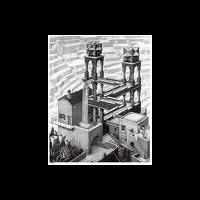Съобщения: 58
Език: English
Francisko1 (Покажи профила) 08 януари 2010, 16:23:00
Francisko J. Garcia.
arcxjo (Покажи профила) 08 януари 2010, 16:43:24
And thou, thy, ye, etc. are pronouns.
Thou - 2nd person singular (like rarely used 'ci' in esperanto)
Thy and thine - 2nd person singular possesive ('cia')
Ye - you

ceigered (Покажи профила) 08 януари 2010, 18:15:40
It's more or less middle (medieval)/early modern English (which the current Modern English's writing system is based on).
Basically, instead of saying "I do", "You do", "He does", "We doen" etc it was "I do(e)", "Thou doest", "He doeth", "Ye doen".
The pronouns were close to (to build on Arĉjo's message):
I, me, my/mine (MI/MIN/MIA)
Thou (tu), thee, thy/thine (VI/VIN/VIA)
He, him, his (and similar variations) (LI/LIN/LIA)
She, her, hers (etc) (ŜI/ŜIN/ŜIA)
(he was used for both genders and "it" for a long time though)
It, its (ĜI/ĜIN/GIA)
We, Us, our, ours (NI/NIN/NIA)
Ye/you, ye/yee, your, yours (VI ĈIUJ/VIN ĈIUJN/VIA)
They, them, their, theirs (They came from Icelandic and the Nordic/Danish languages) (ILI/ILIN/ILIA)
"Ye Olde English" is actually a nice example of a Middle English sentence - "Ye" is sometimes used instead of "the" because there was no "th" sound in Latin, and it wasn't "hellenic" enough to use Ð or þ (þ was a runic letter, not latin).
The Olde English in Old English would be "Ealde Englisc" too...

Anyway:
Early Modern English @ Wikipedia
[url=http://es.wikipedia.org/wiki/Inglés_moderno_temprano]Ingés Moderna Temprano @ Wikipedia Español[/url]
The English article even mentions in the introduction the English language used in the Bible (is it King James Version?).
Jes (Покажи профила) 09 януари 2010, 20:57:35

It remembers me the first time I tried to read Cervantes... it was a bit tough
 and I imagine it is the same for non-english speakers with "Ye Olde English"
and I imagine it is the same for non-english speakers with "Ye Olde English"Plenty of words like those ones can be listed, although now I cannot remember anything... besides "wilst" or "art" (which are very simple
 )
) Jes (Покажи профила) 09 януари 2010, 20:59:03
Vilinilo (Покажи профила) 09 януари 2010, 23:26:01
Oŝo-Jabe (Покажи профила) 09 януари 2010, 23:50:57
Vilinilo:The King James Bible is as old as Shakespeare's works. I am completely unable to understand both.Shakespeare's much harder to understand for me thanks to the contrivances he had to go through to get his works to fit into iambic pentameter. At least the non-poetic parts of the KJV are pretty straight-forward.
Miland (Покажи профила) 10 януари 2010, 12:45:53
Francisko1:I have a book named New Testament in english and spanish languages, but in the english part appear a lot of strange words...I would get a modern translation, if I were you, especially if it's used by 'mainline' churches.
saloli (Покажи профила) 10 януари 2010, 17:24:32
Miland:I would get a modern translation, if I were you, especially if it's used by 'mainline' churches.This really made me laugh! Last October a local Protestant church held a book-burning, which included every version of the Bible except that of King James. Many Christians in my region consider only the KJV (King James Version) to be true, and every other version is the work of Satan. This way of thinking is unfortunately that of the majority in the southern US.
I am a Pagan, but in my region of the US the religious political extremists are practically the law. It is dangerous to be a non-Christian in many cities and towns here. Every year one hears about slander, attacks and even murders against Pagans by Christians.
Interestingly there are many Biblical scholars who consider the KJV to be the worst translation of the Bible.
Tiu ridegigas min!! Pastintan Oktobron loka protestantisma eklezio efektivigis libro-bruligon, kiu inkluzivas ĉiujn versiojn de la Biblio KROM la de la reĝo Jakobo. Multe da kristanoj en mia regiono konsideras nur la KJV versio esti la vera, kaj ĉiuj aliaj versioj estas de Satano. Tiu pensmaniero estas bedaŭrinde tiu de la plimulto en suda Usono.
Mi estas Pagano, sed en mia regiono de Usono la ekstremistoj politikaj religiaj estas praktike la leĝo. Estas danĝere esti ne-Kristano en multaj urboj / urbetoj ĉi tie. Ĉiujare oni aŭdas pri kalumnioj, atakoj kaj eĉ murdoj kontraŭ Paganoj fare de Kristanoj.
Interese estas ke multaj Bibliaj kleruloj taksas la KJV versio esti la plej malpli bona traduko de la Biblio.
Miland (Покажи профила) 10 януари 2010, 20:21:22
saloli:Last October a local Protestant church held a book-burning, which included every version of the Bible except that of King James..there are many Biblical scholars who consider the KJV to be the worst translation of the Bible.To be fair to King James' men, they were the best available 400 years ago, and the KJV can be useful for looking up quotations. But the language has changed since then, and biblical scholarship has made progress as well. I would suggest the Revised English Bible (first published in 1989).







